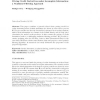Free Online Productivity Tools
i2Speak
i2Symbol
i2OCR
iTex2Img
iWeb2Print
iWeb2Shot
i2Type
iPdf2Split
iPdf2Merge
i2Bopomofo
i2Arabic
i2Style
i2Image
i2PDF
iLatex2Rtf
Sci2ools
106
click to vote
FS
2010
2010
Pricing credit derivatives under incomplete information: a nonlinear-filtering approach
This paper considers a general reduced form pricing model for credit derivatives where default intensities are driven by some factor process X. The process X is not directly observable for investors in secondary markets; rather, their information set consists of the default history and of noisy price observation for traded credit products. In this context the pricing of credit derivatives leads to a challenging nonlinear filtering problem. We provide recursive updating rules for the filter, derive a finite dimensional filter for the case where X follows a finite state Markov chain and propose a novel particle filtering algorithm. A numerical case study illustrates the properties of the proposed algorithms. Keywords Credit derivatives, nonlinear filtering, marked point processes AMS classification : 91B28, 93E11, 60G55 JEL classification: G13, C11
| Added | 25 Jan 2011 |
| Updated | 25 Jan 2011 |
| Type | Journal |
| Year | 2010 |
| Where | FS |
| Authors | Rüdiger Frey, Wolfgang Runggaldier |
Comments (0)

